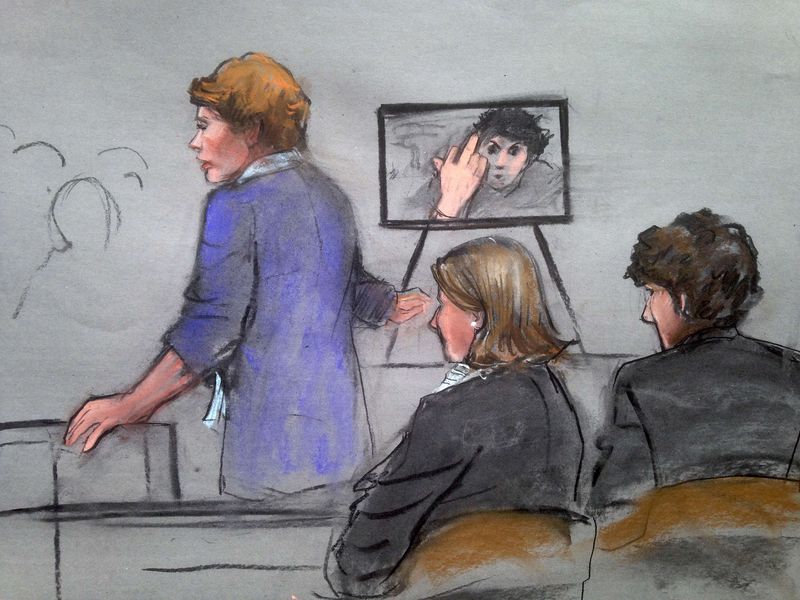By Scott Malone
BOSTON (Reuters) - Celeste Corcoran was hurled into the air by a bomb at the Boston Marathon finish line two years ago. Gillian Reny saw blood gushing from her legs and wondered if she would survive. William Campbell waited hours for his daughter to emerge from surgery only to learn she had been killed by the blasts.
Prosecutors on Tuesday began their case to sentence convicted bomber Dzhokhar Tsarnaev to death with an emotional gut-punch to the jury as survivors described the toll of the April 15, 2013, attack that killed three people and injured 264.
Tsarnaev, a 21-year-old ethnic Chechen, was found guilty on April 8 of carrying out the attack as well as fatally shooting a police officer as he and his older brother, Tamerlan, prepared to flee three days later.
Survivor testimony, photos and video evidence took the same jury that found Tsarnaev guilty back to the immediate aftermath of the blasts, the smoky air rent by the screams of the wounded while those able to move scrambled over shrapnel-strewn sidewalks to try to aid those whose limbs the bombs had mangled.
The government's first witness, Corcoran of Lowell, Massachusetts, said she remained conscious from the moment the two homemade pressure-cooker bombs went off until she was rushed to a hospital where doctors amputated both her legs.
"I remember thinking that the pain was too much and that I wanted to die," Corcoran said in sometimes tearful testimony. "Immediately I was like, 'Hell no. I don't want to die.'"
Corcoran's adult daughter, Sydney, was also badly injured but survived and the two shared a hospital room for weeks.
Reny, who had gone to the finish line on Boylston Street to cheer her sister, described being horrified by her mangled legs.
"I was shocked that much blood could come out of someone," said Reny, now 20. "I did not know that you could be that injured and survive."
William Campbell had been home watching the race on television when he saw the blasts and realized his 29-year-old daughter, Krystle, may have been there.
"That was a real bad day," he testified.
He and his family rushed to a hospital where they were told Krystle was in surgery.
"We waited 10 to 12 hours, talking to the doctors and they were saying they had to cut off her legs and things like that and we said, 'Go ahead and do what you have to do, just save my baby'," Campbell said.
A doctor later asked him to come see his daughter in her hospital gurney, but the patient turned out to have been Campbell's friend, Karen McWatters.
"I looked in the bed and it wasn't Krystle. I passed out on the floor," Campbell said. When he came to, he added, "I realized she was gone."
'ESSENCE OF TERROR'
Prosecutors opened the trial's sentencing phase by showing the jury pictures of the four people Tsarnaev killed: 8-year-old Martin Richard, Chinese exchange student Lingzi Lu, 23, Massachusetts Institute of Technology police officer Sean Collier, 26, as well as Campbell.
"They had time to feel pain," said Nadine Pellegrini, an Assistant U.S. Attorney, in the prosecution's opening statement. "They had time to feel scared and frightened. But they had no time to say goodbye. That is the very essence of terror."
Prosecutors, citing al Qaeda materials found on Tsarnaev's laptop and a note in which he suggested the bombing was retribution for U.S. military campaigns in Muslim-dominated countries, have sought to paint him as a violent extremist.
Defence attorneys have countered that 26-year-old Tamerlan, who died following a gunfight with police hours after Collier's slaying, was the driving force, with Dzhokhar acting in a secondary role out of a sense of sibling loyalty.
Tsarnaev's lawyers opted to delay their opening statement until next week.
In an apparent effort to anticipate a likely defence argument, Pellegrini argued that Tsarnaev's actions could not be blamed on his troubled family.
"You may hear about family dynamics, family history, family dysfunction," Pellegrini said. "But many people, millions of people, I would venture, face troubles throughout their lives. Who among them murders people with a bomb?"
Pellegrini urged the jury not to give too much consideration to evidence that suggested Tamerlan had downloaded radical materials before Dzhokhar.
"The origin of the lineage of terrorism doesn't matter," Pellegrini said. "What matters are his beliefs in terror, his actions."
Pellegrini ended by showing the jury a surveillance photo she said was taken of Tsarnaev in a holding cell on the day of his first court appearance in July 2013.
In the photo, Tsarnaev grimaces and gestures at the camera with his middle finger, an obscene gesture.

"This is Dzhokhar Tsarnaev," Pellegrini said. "Unconcerned, unrepentant and unchanged."